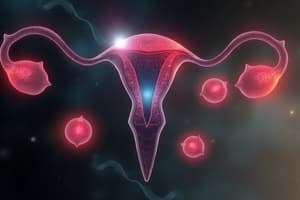Podcast
Questions and Answers
What hormone triggers ovulation during the ovarian cycle?
What hormone triggers ovulation during the ovarian cycle?
- Estrogen
- Luteinizing hormone (LH) (correct)
- Progesterone
- Follicle-stimulating hormone (FSH)
Which phase occurs after ovulation in the ovarian cycle?
Which phase occurs after ovulation in the ovarian cycle?
- Luteal phase (correct)
- Menstrual phase
- Follicular phase
- Proliferative phase
What is the primary hormonal change that triggers the menstrual phase in the uterine cycle?
What is the primary hormonal change that triggers the menstrual phase in the uterine cycle?
- Decrease in progesterone (correct)
- Increase in follicle-stimulating hormone
- Increase in estrogen
- Surge of luteinizing hormone
During which phase does the endometrium thicken due to elevated estrogen levels?
During which phase does the endometrium thicken due to elevated estrogen levels?
If fertilization does not occur, what happens to the corpus luteum?
If fertilization does not occur, what happens to the corpus luteum?
The secretory phase of the uterine cycle is primarily influenced by which hormone?
The secretory phase of the uterine cycle is primarily influenced by which hormone?
Which two phases of the ovarian and uterine cycles overlap?
Which two phases of the ovarian and uterine cycles overlap?
How long does the menstrual phase typically last?
How long does the menstrual phase typically last?
Flashcards
Ovarian Cycle
Ovarian Cycle
A monthly series of events in the ovaries that prepares an egg for fertilization, divided into follicular and luteal phases.
Follicular Phase
Follicular Phase
The initial phase of the ovarian cycle where follicles in the ovary grow and a dominant follicle is selected to release an egg.
Ovulation
Ovulation
The process where the dominant follicle releases a mature egg into the fallopian tube, usually occurring around day 14 of a 28-day cycle.
Luteal Phase
Luteal Phase
Signup and view all the flashcards
Uterine Cycle
Uterine Cycle
Signup and view all the flashcards
Menstrual Phase
Menstrual Phase
Signup and view all the flashcards
Proliferative Phase
Proliferative Phase
Signup and view all the flashcards
Secretory Phase
Secretory Phase
Signup and view all the flashcards
Study Notes
Ovarian Cycle
- The ovarian cycle is a monthly series of events in the ovaries that prepares an egg for fertilization. It's comprised of two phases: follicular and luteal.
- Follicular Phase: This phase begins with the recruitment of several follicles (each containing an oocyte) from the ovarian reserve. The follicles grow and mature, driven by follicle-stimulating hormone (FSH). One follicle, the dominant follicle, develops more rapidly and eventually releases the mature egg – ovulation.
- Ovulation: Triggered by a surge in luteinizing hormone (LH), the mature follicle ruptures, releasing the ovum into the fallopian tube. This process typically occurs around day 14 of a 28-day cycle.
- Luteal Phase: Following ovulation, the ruptured follicle transforms into the corpus luteum. The corpus luteum secretes progesterone, a hormone that prepares the uterine lining for pregnancy. If fertilization doesn't occur, the corpus luteum degenerates into the corpus albicans, eventually disappearing.
Uterine Cycle
- The uterine cycle is a monthly series of changes in the endometrium (lining of the uterus) in preparation for possible implantation of a fertilized egg. The cycle is closely coordinated with the ovarian cycle. It also comprises distinct phases: menstrual, proliferative, and secretory.
- Menstrual Phase: If fertilization doesn't occur, the corpus luteum degenerates, leading to a decrease in progesterone levels. This decline causes the breakdown and shedding of the thickened endometrial lining, resulting in menstrual bleeding. This phase typically lasts about 3-7 days.
- Proliferative Phase: During this phase (roughly correlating with the follicular phase of the ovarian cycle), elevated estrogen levels cause the endometrium to thicken and regenerate. The endometrial glands and blood vessels increase in number.
- Secretory Phase: The rising progesterone levels (from the corpus luteum) during the luteal phase stimulate the development of the endometrial glands. The glands secrete nutrients that nourish a potential embryo. The endometrium becomes increasingly vascular and edematous (swelling with fluid). If fertilization occurs, implantation will take place during the secretory phase.
- Correlation between ovarian and uterine cycles: The timing of the uterine phases coincides with the phases of the ovarian cycle. The proliferative phase overlaps with the follicular phase, while the secretory phase occurs during the luteal phase. This intricate coordination ensures the uterus is appropriately prepared for the potential arrival and implantation of a fertilized egg.
Studying That Suits You
Use AI to generate personalized quizzes and flashcards to suit your learning preferences.




